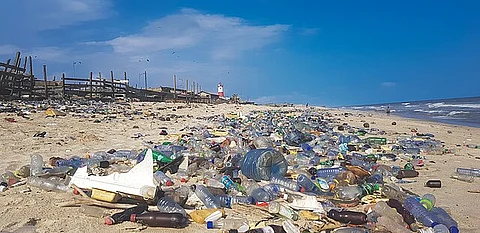

Scientific Mandate for Urgent Action
Professor Richard Thompson, the marine biologist who first coined the term "microplastics" in 2004, is urging delegates at the Geneva treaty negotiations to prioritize human health and environmental protection. Thompson, coordinating the Scientists’ Coalition for an Effective Plastics Treaty, emphasized that microplastics now contaminate ecosystems "from Mount Everest to the deep sea" and accumulate in human organs, including placentas and lungs. His research reveals plastic production has surged 200-fold since 1950, with less than 10% recycled globally. "Business-as-usual is not sustainable," he stated, advocating for binding production limits.
Negotiation Deadlock and Industry Influence
Deep divisions threaten the treaty’s ambition. Over 100 nations support binding plastic production cuts and chemical phase-outs, but major fossil fuel producers, including Saudi Arabia and other countries oppose these measures, advocating instead for improved waste management. The U.S. similarly backs a "lower ambition" treaty without production limits. Meanwhile, 234 fossil fuel and petrochemical lobbyists registered for the talks, outnumbering scientists 4-to-1 and EU delegates combined. Dow, ExxonMobil, and Shell are among firms that expanded plastic production by 1.4 million tons since negotiations began.
Health and Environmental Toll
A landmark Lancet report links plastics to $1.5 trillion in annual health damages, citing rising rates of cancer, infertility, and developmental disorders. Microplastics have been detected in human blood, breast milk, and brain tissue, with animal studies showing links to inflammation and organ toxicity. Without intervention, plastic production could triple by 2060, worsening the 11 million tons of plastic entering oceans yearly. Greenpeace’s Graham Forbes called uncontrolled production a "death sentence," noting petrochemical giants earned $5.1 billion in profits while lobbying against regulations.
Pathways to a Livable Future
Thompson outlined a three-pillar solution: reduce virgin plastic production, restrict toxic chemicals, and transition to a circular reuse economy. Essential measures include banning non-essential single-use items (e.g., bags, cups), improving product design for recyclability, and funding waste management in low-income nations. The International Chamber of Commerce echoed the need for "legally binding caps" and innovation incentives. With talks concluding August 14, delegates face mounting pressure to reject industry obstruction. As Thompson stressed: "We can’t wait decades for perfect science, we need prevention now".